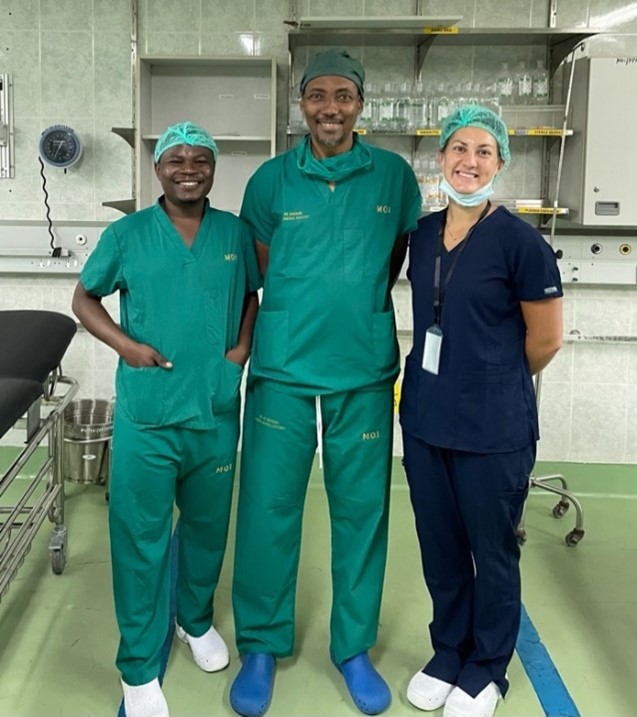
I started my journey as the Global Neurosurgery Fellow in Dar es Salaam, Tanzania, in the summer of 2023. I had just finished a complex spine fellowship at Washington University in St. Louis, where the amount of technology available to perform spine surgery is beyond one’s imagination. The stark differences between the two assignments were remarkable, to say the least.
Project Update: See our 2023-2024 Newsletter
Fortunately I had Dr. Julie Woodfield, the previous fellow, still on-site to introduce me to the team at Muhumbili Orthopaedic Institute (MOI) and get me oriented to my new position. I got started right away by attending the neurosurgery morning meetings, where cases from previous calls are presented and discussed. I was battling jet lag, incredible heat, and the challenges of familiarizing myself with listening to English-Swahili, but I found myself in the middle of some very interesting and challenging conversations related to patient care and surgical planning.
At MOI, patients have to pay for their implants (the screws and cages we routinely use in spine surgery) before we can schedule their operations. One of my first tasks was overseeing donated implants for patients who couldn’t afford them — no easy task, as I was not yet familiar with Tanzanian health care. Having been trained in Canada, where the health care system is publicly funded, I thought everyone should just get their surgery for free!
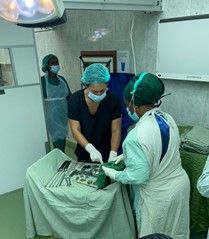
One of the orthopedic OR nurses and me preparing tools needed the halo-pelvic traction device
During my first few months, I focused my time in the operating theatre with the residents and the rest of the faculty. I really wanted to immerse myself in how things were getting done at MOI. The residents showed me some neat tricks, including how to suture with less material and how to attach the bone flap without plates and screws. In return I was able to teach the neurosurgery residents some of the skills I had acquired during my previous fellowship. I stayed late in the operating theatre with them on complex cervical spine surgeries, as we tried to repair the injuries that are so common after motorbike accidents or falls from a coconut tree. Some of the most challenging cases we saw would have been very difficult even in North America, so I was glad to be able to discuss surgical plans with both faculty at MOI and Dr. Roger Härtl in New York.
In between surgeries I was able to have some fun with the OR nurses, who taught me some Tanzanian dance moves, and with the operating theatre staff, who shared delicious pilau (a fragrant rice dish) at the end of long days.
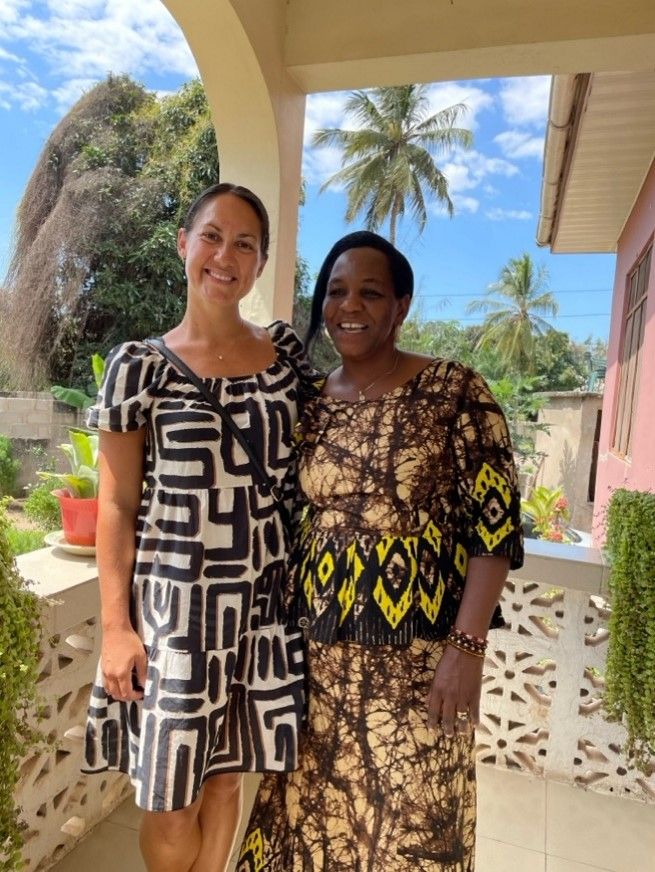
Here I am with one of the OR nurses, Sister Evodia. enjoying beautiful Tanzania
Part of my assignment at MOI was to facilitate the use of spinal technology, especially 3D navigation for instrumentation with the previously donated Brainlab machine. Although navigation has become routine in the West, it is not an easy task in low- and middle-income countries (LMICs), where the facilities are not necessarily adapted to making this technology work smoothly. We had some initial success with the spine navigation system, but then discovered we were missing some consumables that prevented the team from continuing for a while.
Despite these challenges, I worked closely with the research fellow at MOI, Dr. Romani Sabas, to study the experience of the neurosurgeons with the Brainlab system. It has been great to have a research team to collaborate with every Tuesday. We are strongly continuing in the elaboration of our multiple research projects.
My time here at MOI has been very busy so far, with multiple special events going on in addition to our everyday patient care and research:
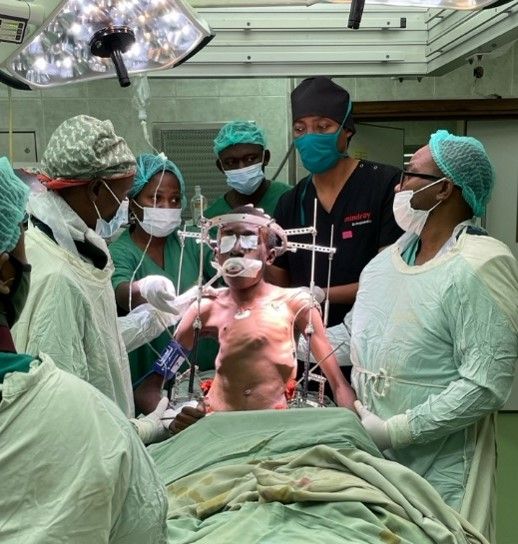
L-R: Dr. Hamisi, Dr. Anastasia (anesthesiologist), Dr. Emerson, Dr. Shabani, and Dr. Mcharo during the application of the halo-pelvic traction device on one young patient
We had a three-day halo workshop at the beginning of November taught by Dr. Alaa Ahmad and Dr. Saad Ilyas, orthopedic surgeons respectively from Palestine and Pakistan. (Halo-pelvic devices are used on children with spinal deformities to straighten the spine.) We had a special day of lectures and hands-on training on pelvic models on a Friday, and then over the weekend we placed halo-pelvic devices on six children with neuromuscular scoliosis.
Shortly after the halo workshop, Dr. Ondra Petr arrived from Austria to direct a new course hosted by the European Association of Neurosurgical Societies (EANS). A delegation of 12 neurosurgeons who specialize in neurovascular, endovascular, and skull base surgery led the course, the first of its kind in East Africa.
Finally, I traveled to South Africa for WFNS 2023, the 18th World Congress of Neurosurgery, hosted by the World Federation of Neurosurgical Societies. I was surrounded by this large global neurosurgery community, and it felt amazing to exchange information and insights on so many topics. It made me recognize that most of the challenges at MOI in Tanzania are a recurrent theme elsewhere in East Africa and Sub-Saharan Africa.
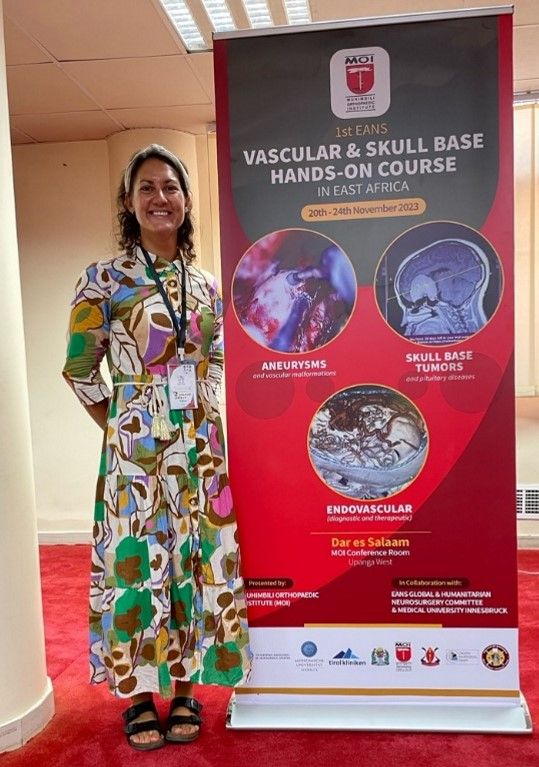
At the first EANS neurovascular and skull base hands-on course
I am now working on planning for our 2024 Scoliosis Week as well as on creating a national scoliosis registry with Dr. Sabas and a future medical student, Isabella Cipollone at Weill Cornell. We are also very much looking forward to Dr. Härtl’s arrival with his international team for the 10th Global Neurosurgery Course, which is coming up at the end of March. We are halfway through preparation for this event, which should be very exciting. I am glad to be working with Dr. Zarina Shabhay, neurosurgeon, and Dr. Consolata Shayo, registrar in neurosurgery. They were both at Weill Cornell Medicine in New York last year as part of the exchange program through the Tanzania Neurosurgery Project, and we make a strong team.
I’m so grateful to Dr. Roger Härtl for his continuous support of the fellowship. His help has been instrumental in helping me navigate this transition from Canada/USA to Tanzania. It was not the easiest transition, due to some much-needed changes in the program logistics, but now I am fully embracing my time here and I am looking forward to the rest of this life-changing experience.
P.S. This entire experience in Tanzania wouldn’t be complete without mentioning the beauty of the landscapes in this country, from its wildlife in the Serengeti to its paradisiac beaches in Zanzibar. A special mention to the Swahili food and the Kilimanjaro beers I'vee enjoyed with the residents and faculty of MOI!
See blog posts from previous Global Neurosurgery Fellows:
An Immersive Experience in Tanzania
Facing the Neurosurgical Challenge of Tanzania